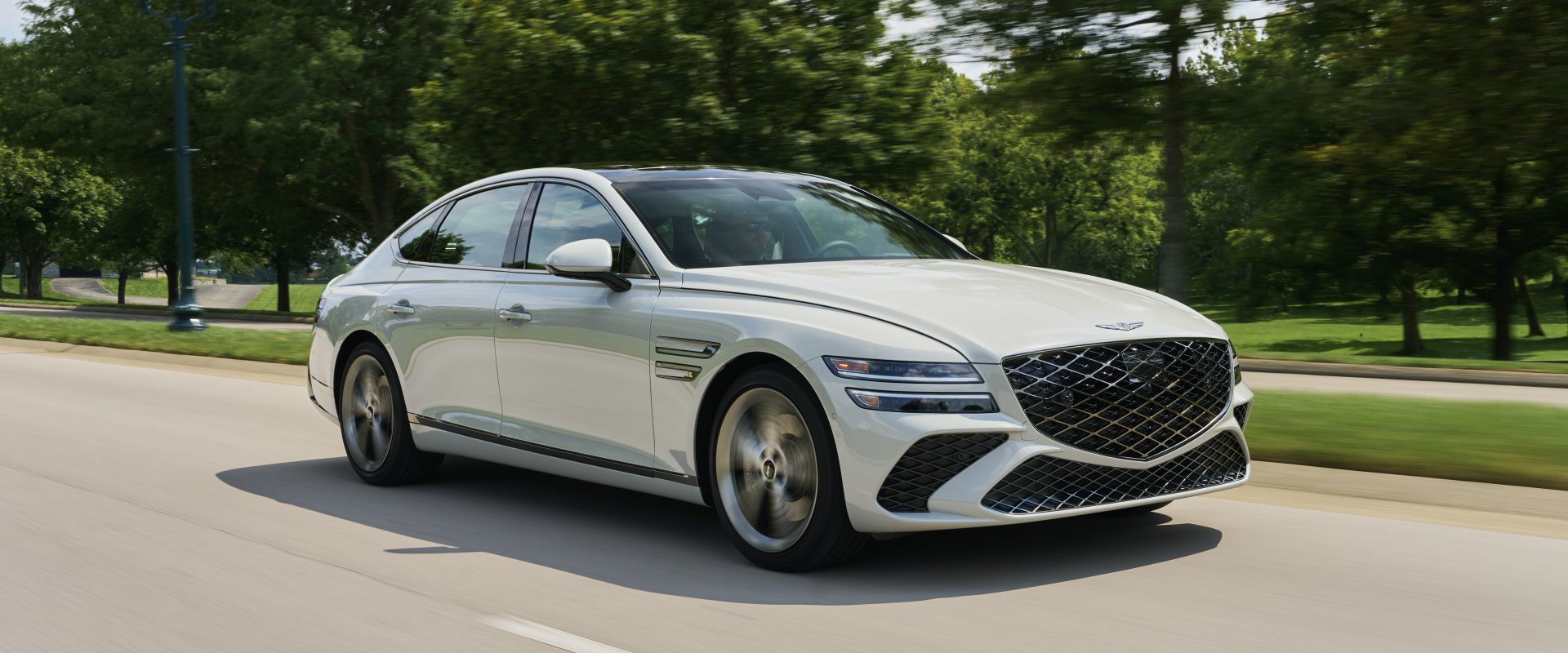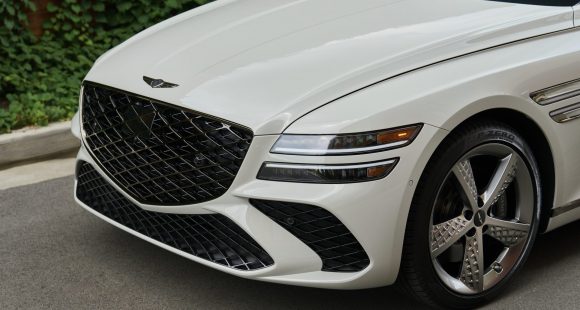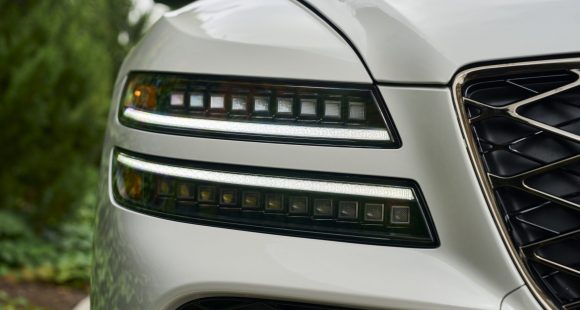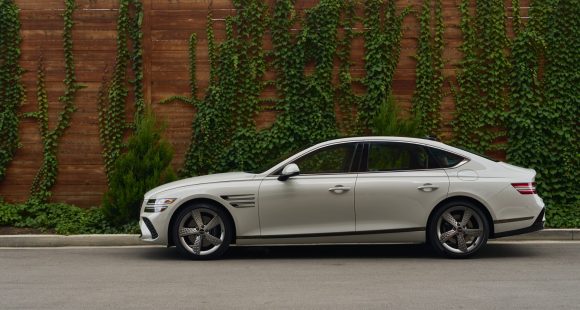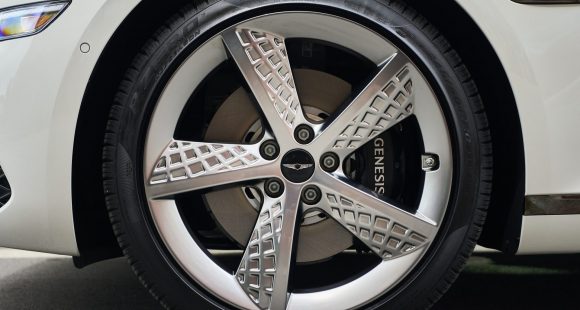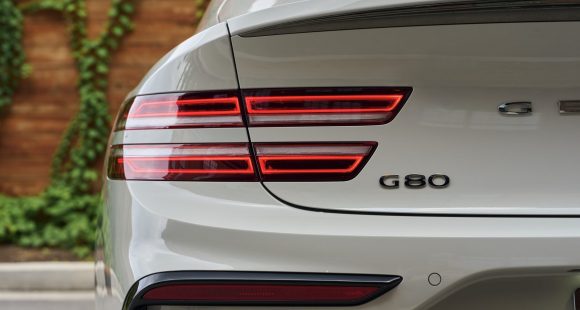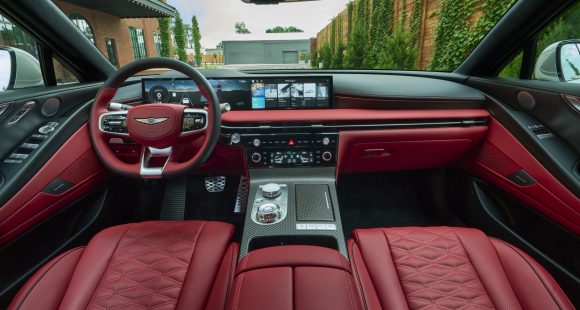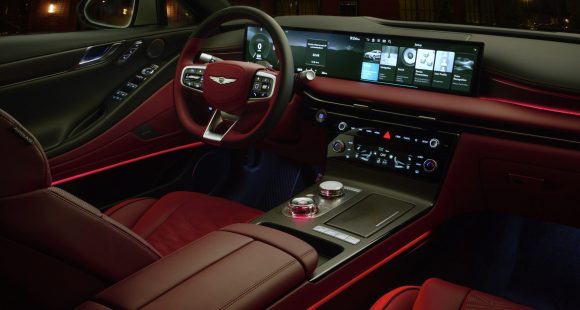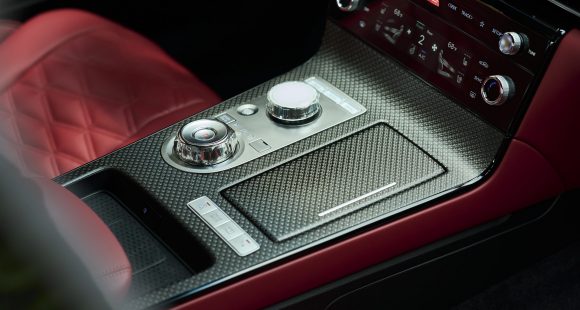2023 Genesis GV60
Right Vehicle At The Right Time
Genesis’ first foray into the world of battery electric vehicles was a modified version of their G80 sedan; and while it was a fantastic effort, getting the full benefits of an EV requires a dedicated EV chassis. So, you can probably see where this is going, this GV60 is their first to ride on Hyundai’s electric global modular platform, yet another new beginning for Genesis.
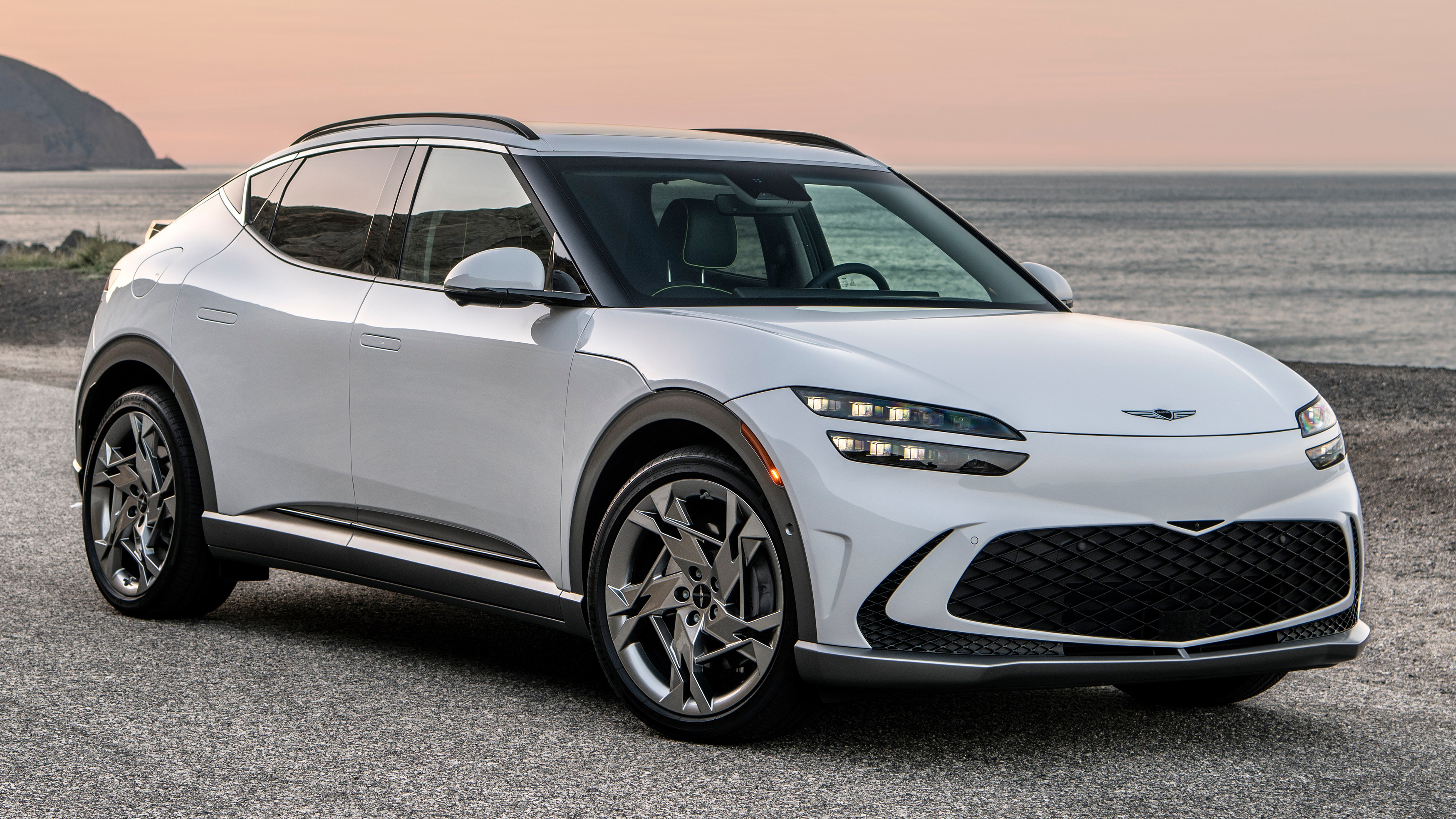 The 2023 Genesis GV60 may be the brand’s first dedicated BEV, but it’s not entirely new to us, as it’s based on the Hyundai IONIQ5 which we tested a few months back and were quite impressed with. And like the IONIQ5, the GV60 is a capable handler, has good overall balance, a smooth ride, and swift acceleration; all things that help you enjoy driving, no matter what the power source.
The 2023 Genesis GV60 may be the brand’s first dedicated BEV, but it’s not entirely new to us, as it’s based on the Hyundai IONIQ5 which we tested a few months back and were quite impressed with. And like the IONIQ5, the GV60 is a capable handler, has good overall balance, a smooth ride, and swift acceleration; all things that help you enjoy driving, no matter what the power source.
The interior is uncluttered and modernly simple, due mostly to the open floorplan, but still highly luxurious; though the tall floating center console keeps it from feeling as roomy as it could. Materials are a mix of sustainably sourced plant-based leather and fabrics made from recycled plastic. A 12-inch high-def touchscreen for infotainment is standard, as is a 17-speaker B&O sound system and a fixed glass panoramic roof.
Just an LCD panel for gauges, which is typical these days, as are the touch-sensitive controls; but there are some unique features and controls to be found, like a boost button on the front of the steering wheel and brake regen paddles behind. We’re generally not fans of rotary style shifters, but when its disguised as a crystal ball, well it’s hard not to be entranced or look for answers. Will this car get to 60 in less than 4–seconds?
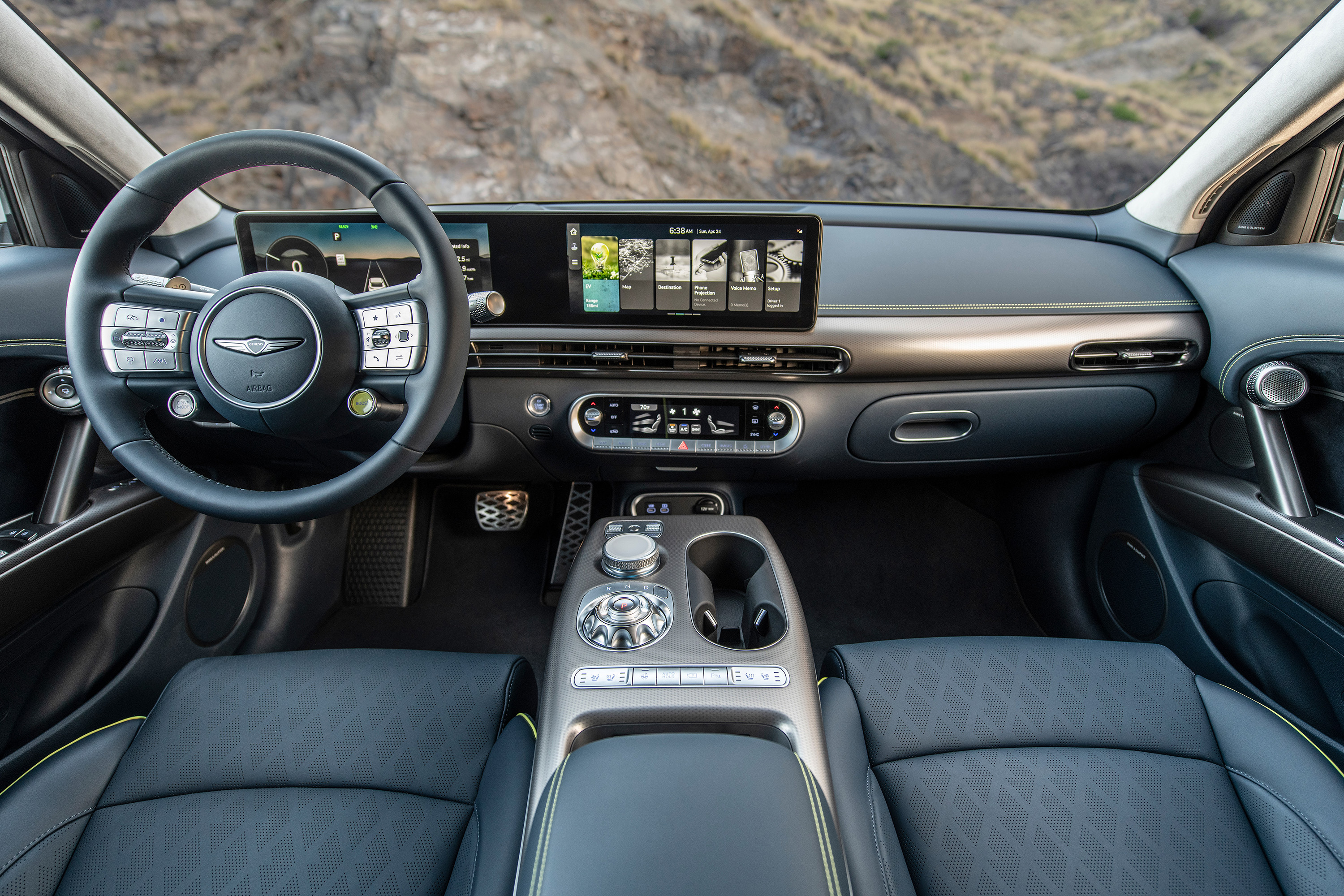 Well, all signs point to yes, as this all-wheel-drive GV60 Performance features a 160-kW electric motor for each axle; outputting a total of 429-horsepower and 516 lb-ft. of torque. The standard Advanced edition has a smaller 74-kW motor up front for a 314-horsepower output, but gets the most range, at 248-miles. Our Performance tester is rated for just 235-miles, but there was an indicated 257 available at 100%. We drove conservatively, doing our best to drain the battery, and were indeed on pace to get 259-miles before needing to plug in. No surprise, the GV60 Performance also has a good efficiency rating of 36.8-kWh/100 miles.
Well, all signs point to yes, as this all-wheel-drive GV60 Performance features a 160-kW electric motor for each axle; outputting a total of 429-horsepower and 516 lb-ft. of torque. The standard Advanced edition has a smaller 74-kW motor up front for a 314-horsepower output, but gets the most range, at 248-miles. Our Performance tester is rated for just 235-miles, but there was an indicated 257 available at 100%. We drove conservatively, doing our best to drain the battery, and were indeed on pace to get 259-miles before needing to plug in. No surprise, the GV60 Performance also has a good efficiency rating of 36.8-kWh/100 miles.
Now, few would call the IONIQ5 gorgeous, but Genesis has certainly taken it in a new direction; with a smooth and purposeful design that showcases the “athletic elegance” side of the brand. Genesis hallmarks such as the barely there parallel lines for headlights and Crest grille remain; but the jagged-line chrome trim, rear spoiler, and color highlights, clearly take it in a sportier direction. Less obvious, is the new wing logo, made thinner to enhance aerodynamics, along with the pop out door handles. And if you happen to forget your key fob, you can access the car and get moving simply with facial recognition.
Since the crystal ball didn’t provide any answers, it was off to the track to get some hard numbers. And there was a tremendous amount of power delivered at launch, with a unique spaceship-like soundtrack along for the ride as we sprinted to 60, taking that full 4.0-seconds. Hitting that boost button on the steering wheel gives you max torque and the sensation that you just engaged warp speed.
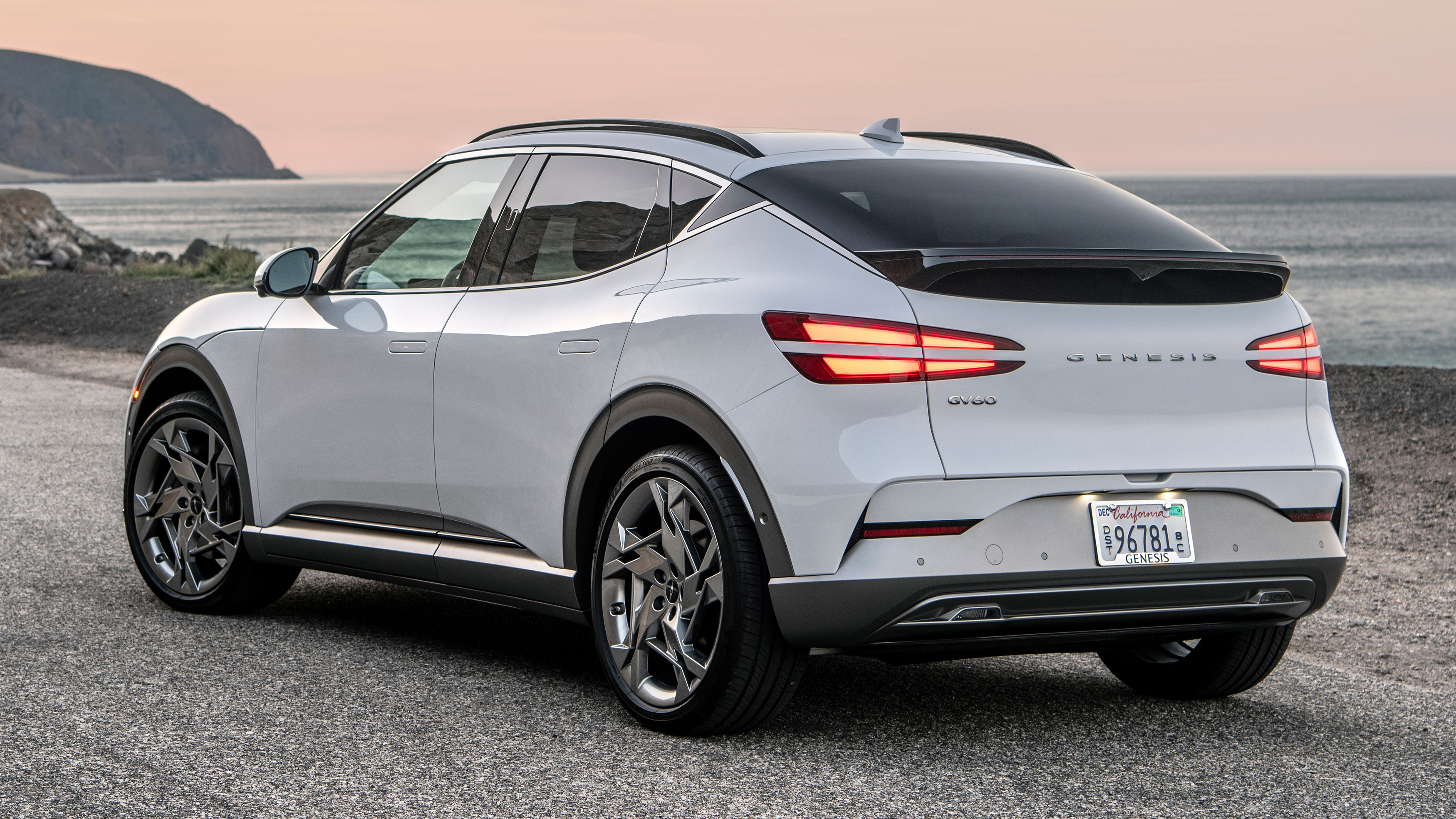 Power delivery stayed pretty intense until we hit 80 miles-per-hour, at which time it leveled off for a more serene finish to the ¼-mile. Our best time was 12.4-seconds at 112 miles-per-hour. The GV60 Performance clearly lives up to its name there, but a little less so when it comes to handling. We could really feel this utility’s weight through the cones, and it doesn’t seem to carry that weight as low as most EVs.
Power delivery stayed pretty intense until we hit 80 miles-per-hour, at which time it leveled off for a more serene finish to the ¼-mile. Our best time was 12.4-seconds at 112 miles-per-hour. The GV60 Performance clearly lives up to its name there, but a little less so when it comes to handling. We could really feel this utility’s weight through the cones, and it doesn’t seem to carry that weight as low as most EVs.
For now, all GV60s are all-wheel-drive, with the base Advanced starting at $59,985; the Performance at $68,985.
So, while the Genesis brand hasn’t been around all that long, big changes are already taking place. Jumping into the EV world with their G80 sedan was a fantastic start, and following it up with this 2023 GV60 utility seems to be the right vehicle at the right time. And, even in the automotive world, timing is indeed everything.
Specifications
- Motor Setup: Dual Motor
- Horsepower: 429
- Torque: 516 lb-ft
- 0-60 mph: 4.0 seconds
- 1/4 Mile: 12.4 seconds at 112 mph
- EPA Range: 235 miles
- MW Range: 259 miles
- Efficiency: 36.8-kWh/100 miles
2025 Genesis G80
New Interior And New Tech Elevates G80 Sedan
Talk about bad timing. This second-generation G80 debuted at the height of a global pandemic. But that hasn’t stopped Genesis or this Bentley-on-a-budget sedan. In fact, since then, Genesis has unveiled a spectacular all-electric version and now given all G80s a makeover. So, let’s find out what a better and better-timed new G80 is ready to deliver.
Breaking into the luxury sedan scene requires going up against traditional brands with long pedigrees and legions of loyal buyers. But Hyundai has never shied away from a challenge, and has made steady progress with their Genesis brand, and hopes that a revised 2025 G80 midsize sedan will be their next step up.
Styling matters more when you’re the upstart, and the Genesis Athletic Elegance theme changes very little for ’25; just a new grille, slightly reshaped bumpers, new wheels ranging from 18 to 20 inches, and an updated color palette. The G80’s unique two-line LED headlamps get revised Micro Lens Array technology that boosts performance while minimizing the brightness for oncoming drivers.
Changes inside are much more significant with an entirely new dash and console, eliminating both the hooded gauge panel and dashtop wide info screen. Merging them together into one 27-inch wide LG panoramic display than runs from behind the steering wheel to over the center stack. There’s a bigger and more comprehensive control panel in the center stack; while the console gets less armrest coverage, more space for storage, and reshaped cupholders. The wider display is still a touchscreen, but there is also a console mounted controller if you prefer to keep it fingerprint free. Both options work well, but the controller is still too easy to confuse with the dial-like shifter.
Materials are on par if not a notch above most European luxury rivals, and there are 18 speakers to crank out 1,400 watts of premium sound from Bang & Olufsen. Top Sport Prestige trim comes with Nappa leather seats, carbon fiber trim, micro-suede materials for the headliner and pillar covers, heated armrests, head-up display, and upgraded active safety features. Front seats are immensely comfortable without feeling overly soft, and there’s plenty of comfort and room for adults in the back seat.
More Bentley than Benz; streaking down the track with European-style solidity that gives you very little indication of the high speed you’re traveling at.
Same powertrains as last year. Base power comes from a 300-horsepower 2.5-liter turbo-four; the upgrade is this 3.5-liter twin-turbo V6 that outputs 375 horsepower and 391 lb-ft of torque. Both are hitched to standard all-wheel drive. At our Mason Dixon Dragway test track, the AWD delivered enough grip for consistent slip-free launches. We hit 60 in 5.0 seconds flat. Run after run, the 3.5T pulled as strong as it sounds. All G80s work with the same paddle-shift eight-speed automatic transmission, and while shifting was silky smooth on the street, here on the track with Sport Mode and wide-open throttle they were noticeably firmer and quicker.
It was a very surreal experience in the cabin. More Bentley than Benz; streaking down the track with European-style solidity that gives you very little indication of the high speed you’re traveling at. For us, that was 105 mph in 13.4 seconds at the quarter. In addition to the G80’s Sport Mode that tightens steering, improves throttle response, adjusts shifting points, firms up the suspension, and reconfigures stability system parameters; Sport Prestige trim adds rear-wheel steering and an electronic limited slip differential. But, even with all of that, it didn’t feel overly sporty in our handling course. Now, we were able to comfortably carry quite a bit of speed through the cones, but there was just an overall soft, somewhat disconnected and heavy presence that had us unsure of how hard we could push. Sport Prestige also adds upgraded performance brakes. They were plenty capable, bringing this 4,600-lbs. luxury liner consistently down from 60 in just 104 feet with little fade.
Government Fuel Economy Ratings for the six-cylinder are 16 City, 24 Highway, and 19 Combined. We averaged a good 21.3 mpg of Premium. Still, that’s a slightly below average Energy Impact Score, using 15.7 barrels of oil annually with 7.8 tons of CO2 emissions.
Considering the amount of luxury packed into the G80, its $58,350 starting price, even though slightly higher than last year, remains pretty remarkable. It’s a substantial step up to the 3.5T though, as it begins at $70,850.
Genesis has existed as a standalone luxury brand for just less than a decade, and it has indeed been making steady progress into what is surely the hardest segment of all to master. The 2025 Genesis G80 sedan continues to impress and is a great option for luxury-minded buyers who prioritize true value over badges.
Specifications
As Tested
- Engine: 3.5-liter twin-turbo V6
- Transmission: eight-speed automatic
- Horsepower: 375
- Torque: 391 lb-ft
- EPA: 16 City | 24 Highway | 19 Combined
- 0-60 mph: 5.0 seconds
- 1/4 Mile: 13.4 seconds at 105 mph
- Braking, 60-0 (avg.): 104 feet
- MW Fuel Economy: 21.3 mpg (Premium)






